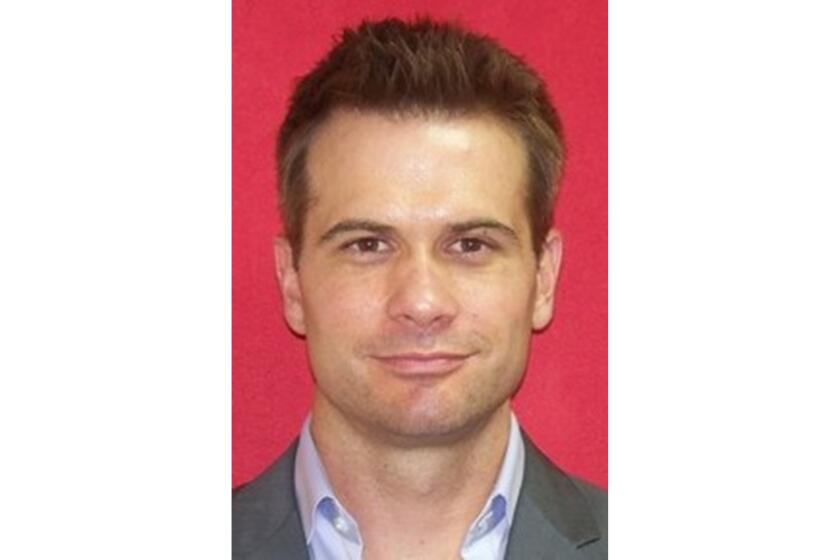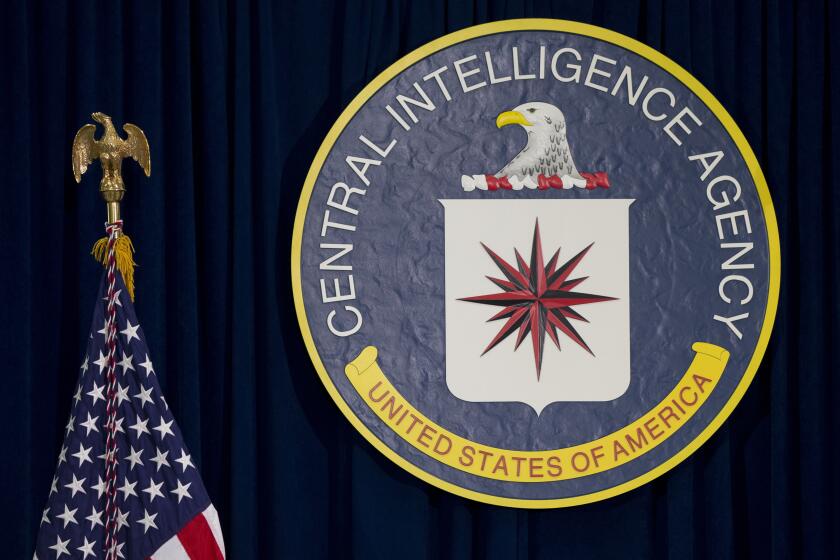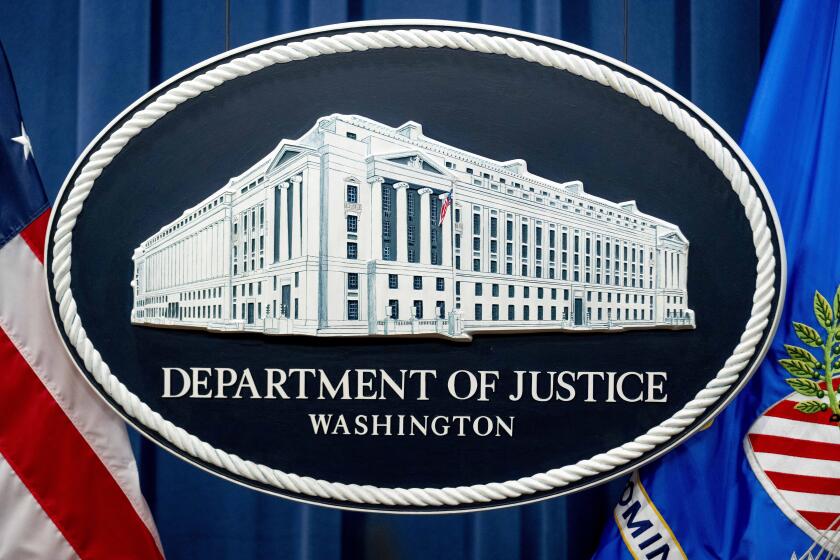New CIA workplace assault case emerges as spy agency shields extent of sexual misconduct in ranks

LEESBURG, Va. — At an impromptu party in the office to celebrate his 50th birthday, a veteran CIA officer got drunk, reached up a colleague’s skirt and forcibly kissed her in front of stunned co-workers, prosecutors alleged in the latest case of sexual misconduct to spill from the spy agency into a public court.
An Associated Press investigation found Donald Asquith’s alleged assault last year happened just days after the CIA promised to crack down on sexual misconduct in its ranks — even as the agency has refused to disclose details on the extent of the problem. A recent 648-page internal watchdog report that found systemic shortcomings in the CIA’s handling of such complaints was classified as “secret,” shielded as a potential threat to national security.
“It is inconceivable that sexual misconduct could be considered a state secret,” said Kevin Carroll, an attorney who represents several women in the agency who have made complaints.
The watchdog report followed an earlier AP investigation that found that at least two dozen women in the CIA had come forward to authorities and Congress with accounts of sexual assaults, unwanted touching and what they described as a campaign to silence them.
Many were emboldened by a CIA officer trainee who went to police in 2022 after the agency failed to take action against a colleague she accused of assaulting her with a scarf in a stairwell at CIA headquarters. Some of those women now say they have faced retaliation, including the victim of the stairwell attack, who was terminated less than six months after suing the agency.
Brian Jeffrey Raymond is accused of drugging and sexually assaulting at least two dozen women. He pleaded guilty to federal sex abuse charges.
“I believed in the institution implicitly and I also believed all of the things the agency said it was doing to rectify what I saw as an epidemic,” said one of those women, who was not named because the AP does not typically identify people who say they are victims of sexual assault. “I realize now that was just lip service.”
Asquith’s case could prove even more embarrassing to the CIA given his lengthy clandestine service overseas and the brazenness of the alleged conduct. It also happened in June 2023, less than a month after CIA Director William Burns announced sweeping reforms intended to keep women safe, streamline claims and more quickly discipline offenders. “We must get this right,” Burns said.
Asquith was charged in April in suburban Washington’s Loudoun County, Va., with misdemeanor assault and battery after a months-long sheriff’s probe into the boozy party in an off-site CIA office attended by at least a dozen people.
His accuser, a CIA contractor, told authorities that she repeatedly rebuffed Asquith’s advances but that he kept pulling closer, rubbing her leg without her consent and making a series of inappropriate sexual comments, as well as “grunting noises and thrusting motions.”
Asquith then “placed his hand up her skirt to her thigh numerous times causing her skirt to lift up, possibly exposing her underwear,” said court documents.
The CIA fired a female employee whose claim that she was sexually assaulted at the spy agency’s headquarters prompted a flood of similar complaints.
The woman told investigators that she slapped Asquith’s hand away and got up to leave, but that he intervened as she approached the door and asked for a “booby hug” before grabbing her with both hands around her back and rubbing his groin and chest on her. She said Asquith then “forcibly hugged her and kissed all over her face and mouth without her consent.”
Asquith did not respond to repeated requests for comment. His lawyer, Jon Katz, hung up when called by the AP.
“CIA takes allegations of sexual assault and harassment extremely seriously,” the agency said in a statement, adding that within days of the incident it restricted Asquith’s contact with the alleged victim, and he retired three months later.
Asquith’s case comes amid a flurry of activity surrounding sexual misconduct accusations at the CIA, including ongoing state and federal criminal investigations into an undercover officer in Europe suspected of knowingly infecting at least three CIA colleagues with an incurable sexually transmitted disease. The agency has not explained why that officer remains overseas.
Just a week before Asquith’s trial begins this month, a federal judge in Washington will sentence another former CIA officer who drugged and sexually abused at least two dozen women he met on Tinder and other dating apps. Prosecutors are seeking a 30-year sentence for Brian Jeffrey Raymond, calling him a serial predator who caused “immeasurable” harm during various overseas postings between 2006 and 2020.
Sue Mi Terry allegedly accepted luxury goods, including fancy handbags and expensive dinners, in exchange for aiding the South Korean government.
And next month, a now-former CIA officer trainee faces a second trial on charges stemming from the 2022 stairwell attack in the agency’s headquarters in Langley, Va. Ashkan Bayatpour has admitted wrapping a scarf around the woman’s neck but says it was intended as a joke. The woman says it was an attack in which he also attempted to kiss her against her will.
“He made a face like he was trying to really hurt me,” the woman testified last year during a bench trial in which Bayatpour was convicted of misdemeanor assault and battery. Under Virginia law, the former Navy intelligence officer is entitled to a jury trial after appealing that conviction.
Former CIA case officer Lindsay Moran, author of a 2005 memoir on her life as a spy, said sexual misconduct has long been a problem in the male-dominated agency and became worse after the Sept. 11, 2001, attacks, when the agency’s focus shifted to deploying clandestine combat units to Afghanistan and Iraq.
“They brought their own brand of male toxicity that was like gasoline on the old-boys network that already existed,” Moran said. “National security is used as an excuse to brush these concerns under the carpet.”
When asked why the watchdog report was classified, keeping secret an accounting of the problem and case histories, the CIA said that decision was made by its inspector general, which conducted the inquiry and did not respond to a request for comment.
The arrest of a former CIA agent for allegedly working for South Korea has intelligence experts asking: Why were her handlers so sloppy?
Also, the CIA has yet to fulfill the AP’s long-standing Freedom of Information Act request seeking internal records detailing its response to the Raymond scandal, and why it took so long to uncover assaults he documented in nearly 500 videos and photos that in some instances showed him groping or straddling naked, unconscious victims.
Florida Republican Sen. Marco Rubio, vice chair of the Senate Select Committee on Intelligence, told AP that lawmakers will continue to “hold agency leaders accountable” after pushing for reforms in the CIA’s misconduct reporting process.
“How far does someone have to go before the agency will step in and say enough is enough?” Barbara Gray, a former CIA officer, said to the AP last year after making an internal complaint accusing her manager of getting into her hotel bed as she slept during a work trip.
The CIA assured Gray the supervisor was being “appropriately punished,” she said, but then promoted him and featured him in a career development video shown to junior officers. Gray, meanwhile, resigned after her career “seemed to grind to a halt.”
“What culture is CIA nurturing when it promotes some of its most egregious offenders?” she said. “I believe the agency is making an effort to improve its reporting processes and procedures, but my question is: What comes next?”
Mustian and Goodman write for the Associated Press. Goodman reported from Miami.
More to Read
Sign up for Essential California
The most important California stories and recommendations in your inbox every morning.
You may occasionally receive promotional content from the Los Angeles Times.














